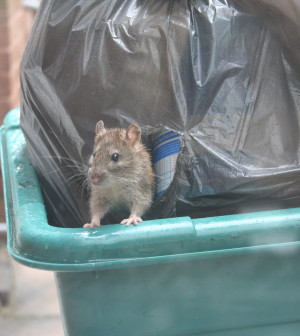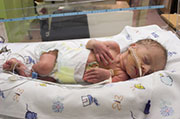- Stigma, Shame Hit Many Gay Men Affected by Mpox Outbreak
- Calories, Not Meal Timing, Key to Weight Loss: Study
- Dietary Changes May Beat Meds in Treating IBS
- Screen Pregnant Women for Syphilis, Ob-Gyn Group Advises
- Even With Weight Gain, Quitting Smoking in Pregnancy Still Best for Health
- A-Fib Is Strong Precursor to Heart Failure
- One Neurological Factor Keeps Black, Hispanic Patients From Alzheimer’s Clinical Trials
- Managing Blood Sugar After Stroke Could Be Key to Outcomes
- Dozens of COVID Virus Mutations Arose in Man With Longest Known Case
- Blood Test Might Someday Diagnose Early MS
Gut Bacteria in Preemies Altered by Hospital Stay, Study Finds


Gut bacteria in premature infants don’t come from their mothers, but from microbes in the neonatal intensive-care unit (NICU), a new study finds.
Babies typically get their gut bacteria from their mothers during childbirth. Premature infants, however, receive antibiotics during their first week of life to prevent infections, and these antibiotics eliminate many of the microbes the infants receive from their mothers.
As a result, microbes from the NICU colonize the digestive tracts of premature infants, the University of California, Berkeley, researchers found.
The researchers swabbed the most-touched surfaces in an NICU and collected fecal samples from two premature infants in the unit. The surfaces checked for microbes included the sink; feeding and breathing tubes; the hands of health workers and parents; incubator access knobs; and keyboards, cell phones and other electronic equipment at the nurses’ station.
The researchers found that the gut bacteria in the two infants were similar to those found on the surfaces in the intensive-care unit. The most abundant types of gut bacteria in the infants were similar to those found on feeding and breathing tubes.
The study was published recently in the journal Microbiome.
“The most common species found in our study — Enterococcus faecalis, Staphylococcus epidermidis, Escherichia coli and Bacteroides fragilis — all have been associated with disease in preterm infants, but can also be commonly isolated from healthy infants and adults,” study author Brandon Brooks said in a journal news release.
“The strains found here are largely opportunistic, lacking many of the really nasty genes found in ‘outbreak’ versions of their respective strains,” Brooks said. “The bacteria would need to be further tested to fully understand [any potential threat].”
Both infants in the study were healthy when they left the hospital.
More information
The U.S. National Institutes of Health has more about human microbes.
Source: HealthDay
Copyright © 2024 HealthDay. All rights reserved.










